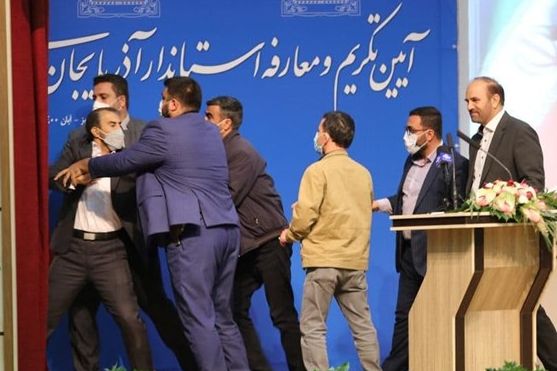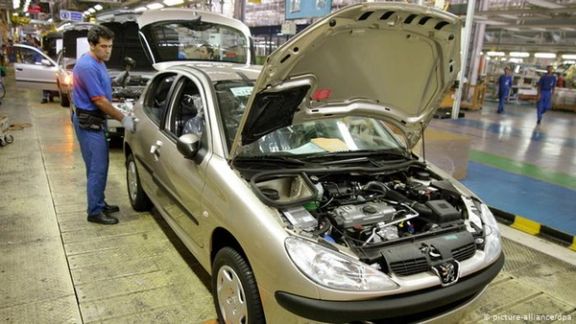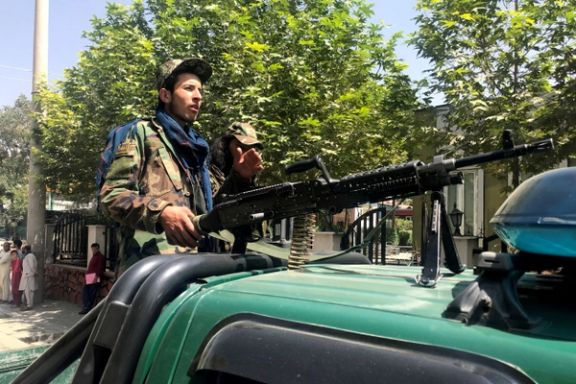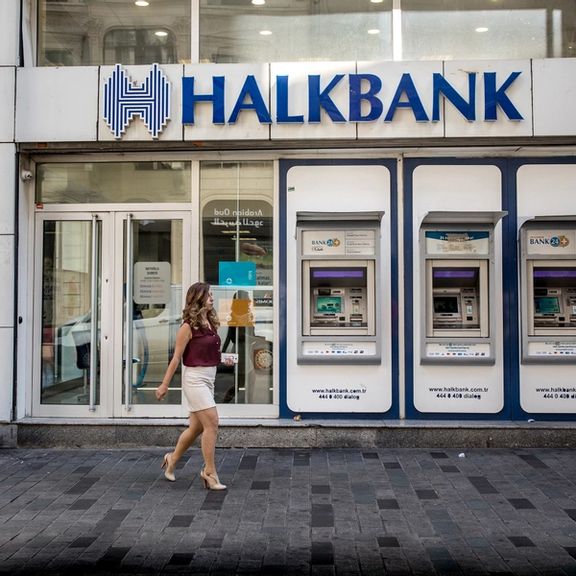Military Officer Slaps New Governor In Iran During His Inauguration

A former IRGC provincial commander who was recently appointed as governor was slapped by another military officer during his inauguration ceremony on Saturday.

A former IRGC provincial commander who was recently appointed as governor was slapped by another military officer during his inauguration ceremony on Saturday.
Abedin Khorram who earlier this week was appointed as Governor of East Azerbaijan Province was slapped by “a member of the armed forces” in the presence of Interior Minister Ahmad Vahidi, according to Fars news agency affiliated with the Revolutionary Guard.
Fars, without naming the individual, said that he had a personal issue with Khorram, who offered another explanation to the state television.
The new governor said that the person who slapped him was angry because “a man [not a woman] had administered his wife’s Covid-19 vaccine”. According to Islamic rules, opposite sexes who are not immediate family members should not touch one another.
Khorram was asked how the person was able to enter the inauguration venue. He replied that obviously there was lapse of security and officials will investigate that.
Iran’s President Ebrahim Raisi (Raeesi) has appointed many IRGC officers in top positions, which has led to criticism by many. Khorram was commander of Revolutionary Guards in the same province until he was appointed governor.

The leader of Lebanon's Hezbollah on Friday warned Israel against drilling for oil and gas in the disputed maritime border area until the issue is resolved.
Hezbollah would take action if Israel did so, Hassan Nasrallah, the leader of the Iran-backed group warned.
"If the enemy thinks they can act as they please before reaching a solution to this issue they are wrong," Nasrallah said in a televised speech.
Lebanon's cabinet had raised the question to the United Nations permanent representative after Israel granted US oilfield services group Halliburton an offshore drilling contract in the Mediterranean, asking to clarify whether the drilling would take place in disputed areas.
Lebanon and Israel are in dispute over the delineation of their territorial waters and negotiations could lead to Lebanon being able to unlock valuable gas reserves amid its worst-ever financial crisis. Israel already pumps gas from huge offshore fields.
The two countries have been holding on-off US mediated talks since October 2020 to try to resolve the issue.
"I will not state any positions on this as I don't want to complicate the negotiations but for sure the resistance in Lebanon…when it finds that Lebanese oil and gas is in danger…it will act accordingly," Nasrallah said.
The US mediator for the indirect talks, Amos Hochstein, visited Beirut this week and said a period of shuttle diplomacy would proceed any return to indirect talks between the two countries.
Reporting by Reuters

Iranian President Ebrahim Raisi recently said Iran’s car industry should apply the technology, and show the motivation, developed under sanctions in the arms sector.
"Our military and nuclear industries have been subjected to the worst sanctions, but we have made great achievements because we have acted as if we were doing motivated jihad (effort) to make progress," he said, during a visit to Bushehr province October 8.
Raisi went on to reply to those who he said asked why Iran could build missiles but faced problems with automobiles. "The answer is clear − because we have not invested the technology of the missile industries in the automotive industry.”
Raisi’s comment could have applied to the Soviet Union’s centralized economy where the country could compete with the United States in weapons and space exploration but was unable to produce quality kitchen appliances or cars.
Iran's automotive industry, the county’s largest after oil and gas, employs 700,000. It was valued in 2020 at $26.4 billion by India-based Modor Intelligence, which forecasts 10 percent sectoral annual growth to 2026. This would be possible without sanctions and with new infusion of investments and foreign partnerships. The analysts attributed a recent decline in growth to Covid-19 and United States sanctions.
French companies Peugeot and Citroen withdrew from substantial joint projects in Iran when the US introduced ‘maximum pressure’ sanctions in 2018, but Iran, reports Motor Intelligence, “is taking the necessary actions to boost the production of vehicles and parts locally to meet the demand for vehicles and reduce its import cost.”
Intelligent cars
Speaking to the Iranian Students News Agency (ISNA) Friday, Deputy Chief of Iran's traffic police, Brigadier-General Taymour Hosseini said road accidents were occurring due to inadequate safety standards as Iranian companies struggled to keep up. "Big companies in the world are working on intelligent cars but we have dropped our expectations so much that we are happy with having anti-lock braking systems,” he said.
With around 20,000 annual deaths, Iran has a poor traffic safety record. According to World Health Organization (WHO) data published in 2018, road traffic accidents deaths in Iran reached 21,831 or 6.5 percent of all fatalities.
The WHO said in fact-sheet published in June that93 percentof world road fatalities occurred in low- and middle-income countries, which have only 60 percent of the vehicles. “Road traffic injury death rates are highest in the African region,” with traffic accidents globally “the leading cause of death for children and young adults aged 5-29 years,” the WHO noted.
Iran's trade officials say neighboring Iraq, once along with Syria a thriving market for Iranian vehicles, has rejected Iranian vehicles due to their failure to meet the required standards. Hamid Hosseini, former secretary of Iran-Iraq chamber of commerce told Fararu website that Iraqis were particularly concerned about airbags, fuel consumption and braking systems.
"Special attention should be paid to safety issues and quality if this administration seriously wishes to export automotive products,” Hosseini said. “Otherwise exporting vehicles will not happen," he claimed. Hosseini also said that higher standards in Iraq meant that it would no longer be possible to produce vehicles in Iraq even if US sanctions were lifted.
According to the latest figures, in the past five months Iran has exported only 514 vehicles due to various reasons, including international banking issues resulting from US sanctions.

Human Rights Watch (HRW) has accused the Taliban of forcibly evicting thousands of Afghans as collective punishment against mainly the Shiite Hazara minority.
The New York-based human rights organization said in a statement that the Taliban, who are Sunni extremists, have forced hundreds of families in different parts of Afghanistan to leave their homes and farms.
HRW said that the move was partly motivated by land grab, whereby the Taliban distribute the agricultural lands to their supporters or ethnic keen. The Taliban are mainly from the Pashtun ethnic group.
“The Taliban are forcibly evicting Hazaras and others on the basis of ethnicity or political opinion to reward Taliban supporters,” said Patricia Gossman, associate Asia director at Human Rights Watch. “These evictions, carried out with threats of force and without any legal process, are serious abuses that amount to collective punishment.”
There have been at least to bombing attacks against the Hazara community in Afghanistan attributed to the Islamic State group, a seemingly rival group to the Taliban
Iran’s Shiite government has called on the militant group, who captured the country in August, to protect minorities, particularly Shiites.
The Hazaras were targets of Taliban violence during the earlier period of their rule in Afghanistan before 2001.

A US appeals court on Friday rejected Halkbank's bid to dismiss an indictment accusing the state-owned Turkish lender of helping Iran evade American sanctions.
The 2nd US Circuit Court of Appeals said even if the Foreign Sovereign Immunities Act shielded the bank, the charge against Halkbank falls under the commercial activity exception.
Prosecutors accused Halkbank of converting oil revenue into gold and then cash to benefit Iranian interests and documenting fake food shipments to justify transfers of oil proceeds.
They also said Halkbank helped Iran secretly transfer $20 billion of restricted funds, with at least $1 billion laundered through the US financial system during international sanctions from 2011-2015.
Halkbank has pleaded not guilty to bank fraud, money laundering and conspiracy charges over its alleged use of money servicers and front companies in Iran, Turkey and the United Arab Emirates to evade sanctions.
The bank had argued that it is immune from prosecution under the federal Foreign Sovereign Immunities Act because it was "synonymous" with Turkey, which has immunity under that law.
Halkbank had been appealing an Oct. 1 ruling by US District Judge Richard Berman allowing it to be prosecuted.
Berman has overseen several related cases, including the conviction of a former Halkbank executive and a guilty plea by Turkish-Iranian gold trader Reza Zarrab.
Halkbank's case has complicated US-Turkish relations, with President Tayyip Erdogan backing Halkbank's innocence in a 2018 memo to then-US President Donald Trump.
Reporting by Reuters

Mass Friday Prayers resumed in Tehran after a 20-month Covid-19 interruption, as the main sermon emphasized unity among Muslims and warned of foreign plots.
The youngest Friday Prayers’ Imam in Tehran, Mohammad-Javad Haj Ali Akbari reiterated this week’s calls by Iranian officials at the International Islamic Unity Conference held in Tehran for Muslims to strive for friendship and close ranks against “foreign plots”.
The Islamic conference is a public relations event organized by the Islamic Republic to show that there is unity among Shiites and Sunnis and to carve a place for the clerical regime among other Muslims.
Iran has started talks with Saudi Arabia since April for reducing tensions and possibly reestablishing relations that were severed in 2016. Iran is keen to show the West that it is trying to improve ties with regional countries on its own and there is no need for them to demand negotiations over the issue.
The Friday Prayers Leader praised Iranian armed forces for their “brilliant” accomplishments and claimed that “Americans with their scandal in elections and defeat in West Asia, which was a strategic defeat, have no option but exit from Iraq.” He added that the US after spending 8 trillion dollars in West Asia was defeated and “even if it spends 800 trillion, it has no option but to leave” the region.
The prayers at Tehran University, a gathering of religious and political significance, came as authorities warned of a sixth wave of the coronavirus, which according to official figures has claimed 124,928 lives in Iran and afflicted more than 5.8 million. Critics of the government’s handling of the pandemic say the real death toll was at least twice the official figure.
The government says more than 28.2 million people have so far received a second dose of the Covid-19 vaccine.
“Today is a very sweet day for us. We thank the Almighty for giving us back the Friday prayers after a period of restrictions and deprivation,” said Haj Ali Akbari said.
Worshippers had to heed social distancing and use face masks during the gathering, a forum where officials present a unified front in the weekly sermon, a duty that rotates around senior members of Iran’s conservative clerical establishment.
Most worshippers brought their own prayer rugs and clay tablets used during prostration, said the broadcast.
It said Friday prayers also were performed in several other Iranian cities.
Health Minister Bahram Einollah said earlier this week that it was a "certainty" that Iran would face a sixth wave next week. The warning came even as the country has accelerated its vaccination drive.
Einollahi added that his country was well-prepared for the new surge.
Schools with more than 300 students will re-open on Nov. 6, Alireza Kamarei, spokesman for Iran’s Education Ministry, said earlier this week, adding that it was not essential for students and teachers to be vaccinated. He said 85% of the country's teachers and 68% of students had so far been inoculated and that classrooms were well ventilated.
With reporting by Reuters
Tweet unavailable